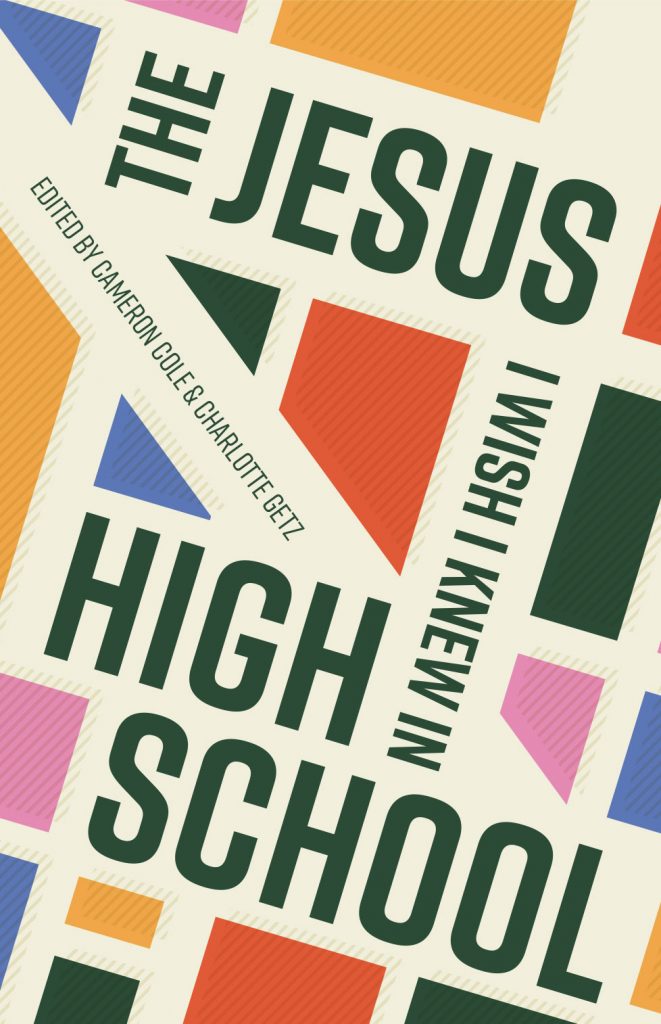The pressure of being a teenager can be overwhelming. School, sports, jobs, relationships, and a growing number of responsibilities all press in at the same time. But the hardest part can be feeling alone, that you have no one to share your most difficult problems with, or that no one takes you seriously. In The Jesus I Wish I Knew in High School from Rooted Ministry, thirty authors from many different backgrounds come together to say, “We get it—and Jesus gets it too. Here’s who Jesus is and how he wants to meet you in this intense time.”
Edited by Cameron Cole and Charlotte Getz, The Jesus I Wish I Knew in High School will help teens discover the love, freedom, affection, and acceptance we all so desperately long for—in Jesus.
Learn more in this interview with Cameron and Charlotte.
Q: Please introduce us to The Jesus I Wish I Knew in High School.
The Jesus I Wish I Knew in High School is a collection of thirty essays from thirty unique authors with a range of voices and stories, written directly to the teenage reader. In each chapter, the adult author illustrates a story or circumstance from their high school years and then reflects on the idea that if they’d known Jesus in high school the way they know him now, they would have experienced more joy, freedom, and forgiveness. They’d have felt less alone.
In each chapter, the author draws connections from his or her story to various biblical and theological truths, reminding readers that every detail of their lives is relevant and known by the God of love himself. The chorus of authors in this book have diverse backgrounds, ages, and ethnicities, and it is our great hope that every teenager (and adult) who picks up this book will find their own story reflected in these pages. The Jesus I Wish I Knew in High School can be read straight through as with any book or a chapter at a time as a devotional—either on their own or alongside a parent or youth leader.
Q: Why did Rooted Ministry feel like The Jesus I Wish I Knew in High School was a book that teens today really needed?
The world today is noisier and more clamorous than ever—there is so much vying for our kids’ attention. We want them to know that the answer to their greatest questions, their most dire needs, their most humiliating shame, is waiting for them in the arms of a loving and gracious Savior.
We want them to know that the God of the Bible is not silent to their most pressing needs, but instead is right alongside them, drawing them closer and closer to himself. We want students to know that while they may be lonely, they are not alone; while they may feel guilty and ashamed, they have already been forgiven; while they may feel useless and inept, the Creator God of the universe has a good plan for their lives; and while they may feel an inordinate pressure to perform, they are right now perfectly loved and called worthy by Jesus. The Jesus I Wish I Knew in High School roots all of our stories within the Big Story, the gospel story, and reminds kids that nothing they do or don’t do can place them outside the love of God.
Q: What is it about the teenage years that is so difficult?
What isn’t difficult about the teenage years? Teenagers have many of the expectations of adults, yet few of the freedoms. They have real dreams and longings, with nary a tool to bring them about. They are thrust into the wild west of the American high school, where it’s often eat or be eaten. Their hormones are raging. And saddest of all, most of these teenagers are not being fed the gospel of grace or given a rich biblical and theological education, even at church or youth group. They therefore have nothing real or trustworthy to cling to in this wilderness of the fallen world.
It is our mission at Rooted Ministry to equip and empower adults with spiritual influence over kids to offer grace-filled, gospel-centered, Bible-saturated discipleship at the church and at home. We hope The Jesus I Wish I Knew in High School will be another tool in the toolbox for parents and youth workers to lead their kids toward a lifelong faith in Christ. We know by now that this foundation is their only certain hope.
Q: What are some of the reasons why teens who are active in youth group in high school stop going to church when they graduate?
I think idolatry and the cares of the world are probably the biggest issues that lead my students away. They believe that the pleasures of the world or that career success and wealth will satisfy them. As a product, they neglect their relationship with Jesus in chasing those things.
Q: Most high school students aren’t interested in one more thing to read. Do you have any suggestions for parents and youth leaders on how to get this book into the hands of their teens and encourage them to give the book a try?
For some kids, it might be a matter of just buying the book and giving it to them. However, as parents, grandparents, and youth leaders, we are always looking for a good point of connection with our students. We recommend you suggest reading this book devotionally alongside the student in your care, or with a group of students. You could each read a chapter on your own, and then come together for coffee or a meal to discuss it. We’ve included questions for reflection at the end of each chapter, to make it as easy as possible to use the book as a discipleship tool.
We promise that the stories in these chapters are real, gritty, and relatable. They will resonate with your teenager. And in this Twitter-minded world where many of us are only capable of digesting smaller bits of information at a time, we aimed to make the chapters on the shorter side so that kids could engage with the material in digestible portions.
Q: Who are some of the authors that contributed to the book? How did you recruit the authors who wrote chapters?
Some of the more well-known authors of this book are Scott Sauls (author of Befriend, A Gentle Answer, and Jesus Outside the Lines), Jen Pollock Michel (author of Surprised by Paradox, A Habit Called Faith, and Teach Us to Want), Michelle Reyes (Vice President of the Asian American Christian collaborative and author of Becoming All Things), David Zahl (Founder and Director of Mockingbird Ministries and author of Seculosity and Low Anthropology), Sandra McCracken (Christian singer/songwriter and author of Send Out Your Light), and Scotty Smith (well-known pastor, preacher, and author of several books, including Searching for Grace). Many of our other authors are unknown but come with rich and relatable high school experiences.
In some cases, we asked a particular author because of their reputation and respect within the broader Christian Church, but oftentimes we knew we wanted a certain narrative or experience to be a part of the collection and we went looking for the person who had lived it.
Q: What are some of the teen struggles addressed in the stories that the authors share?
Some of the stories in this book are more “hot-button” like premarital sex, struggles with pornography, suicidal thoughts, being the victim of racial discrimination, or losing a parent at a young age. But most are more universally relatable, like being suffocated by the pressures to perform academically, not being chosen as the captain of a sports team, having a challenging home and family life, wondering if God has a plan for your life, feeling self-righteous and like we’ve got life all figured out, and struggles with body image.
Again, so many of the themes in these stories—even in the more extreme ones— point to the same gospel truths that God, through his Son Jesus, has called his children perfectly worthy, eternally loved, and full of purpose.
Q: Even though the stories may be different, what are some of the common struggles with faith that pop up throughout the book?
The common struggles of faith that are most seen throughout The Jesus I Wish I Knew in High School are the universal effects of the fall. The world changes, but the human experience in the fallen world does not. As a product of the fall, we experience shame, loneliness, fear, insecurity, and pain. We see these common human struggles popping up repeatedly throughout the book.
Q: How is each chapter divided? How is The Jesus I Wish I Knew in High School intended to be read and used?
Each chapter is divided into three sections. First, the narrative, where the author describes in detail his or her high school experience. Second is “The Jesus I Wish I Knew.” In this section, the authors connect their story to a particular theological truth. We don’t just want to talk about God in this book; we want to root kids into the living Word of God. We believe passionately that biblical and theological depth is a key missing component in the discipleship of most teenagers. So we’re modeling it in each and every chapter. Lastly, is “The Jesus I Want You to Know.” In this section, the author speaks directly to the teenager in first person. It is a personal plea and gospel exhortation to the reader of our only hope in life and death: the life, death, and resurrection of Jesus Christ on our behalf.
Q: Is there a story in the book that you found especially powerful? Why did you find that story special?
Charlotte: One of the chapters that stands out most to me is from Dawson Cooper. Dawson became pregnant in the first semester of her freshman year in college with her high school boyfriend. The quickly married, and today have three children together. This story stands out to me because much of our parenting and youth ministry is often focused on keeping our kids’ behavior in line. Premarital sex is often conveyed as the sin above all sins. And while of course we believe God intended sex for marriage, what we learn in this chapter is that even in our worst shame, Jesus is not our judge and executioner but our only salvation, and a lifeline to cling to for certain rescue.
Cameron: I found Rebecca Lankford’s story particularly powerful because I was her youth pastor and I was there when she was chosen to be the homecoming queen alternate. Rebecca tells the story of how she wanted to be the queen but finished second. She presented herself as a person who had it all together. I figured she was thrilled to be the alternate and was so happy for her. Little did I know that she was experiencing a deep sense of rejection and disappointment. Her story reminded me that every child (and person), even the person who appears to have it altogether, struggles with the pains of this life. We all need the healing grace of Jesus, and we all need the assurance of our identity in Christ.
Q: Would you share a little bit of your own The Jesus I Wish I Knew story? What message do you hope students take away from your experience?
Charlotte: My story is ordinary, but also fairly universal. In high school, I longed to live an extraordinary life filled with wonder and adventure. The problem was that by all appearances, my life was just vanilla. I looked to all sorts of things to spruce it up: a boyfriend, dreams of becoming a movie star, etc., but nothing seemed to satisfy that longing. What I know now is that I was and am a part of the greatest story of all time. I’ve been written into God’s story since the beginning. And in that story, I am a leading lady worth dying for. I want kids to know that they can stop striving to be special or enough. They can stop trying to muscle their way into their own cool identity. I want them to know how intimately known and loved they are by the God who created the mountains and the seas and also our very hearts. This is the God who calls us his very own. I want them to know that the Big Story is the one they’re walking in right now, and that God has written them into it with care, intention, and the utmost grace.
Cameron: My story involves my life as a teenager revolving around having a perfect college resume. I lived on a performance treadmill and experienced so much pressure. During my sophomore chemistry class, I bombed a test and made my first F. I lost it—absolutely lost it—and had a profanity-laced temper tantrum. People were stunned because I maintained a squeaky-clean Christian veneer. In my chapter, I talk about how Paul had the perfect Christian resume, but ultimately found it to be worthless. Paul found freedom in receiving the righteousness of Jesus. In my chapter, I talk about the freedom of being “enough” through Christ and freed from the need to prove myself.
The Jesus I Wish I Knew in High School
The pressure of being a teenager can be overwhelming. But the hardest thing can be feeling alone, that you have no one to share your most difficult problems with. In The Jesus I Wish I Knew in High School, thirty authors from many different backgrounds come together to say, “We get it—and Jesus gets it too.”






